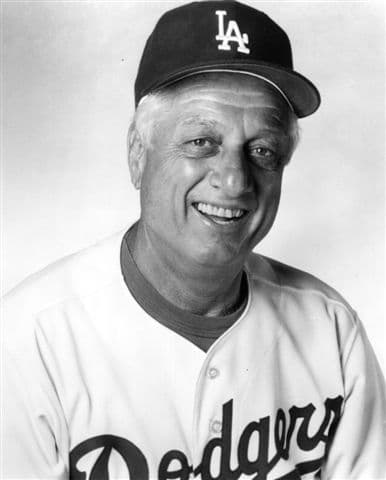
November 12, 2005 – Thomas Charles “Tommy” Lasorda was never one to hide his feelings. His passion for the Dodgers was such that he was said to bleed Dodgers blue. He was no less open about his pride in his Italian heritage. Prior to Italy’s game against the heavily favored Venezuela squad in the inaugural World Baseball Classic in 2006, the 79-year-old former manager addressed the team in the locker room. Appealing to the players’ sense of pride in their heritage, he said, “Each and every one of you has that Italian blood. Italy gave me the greatest gift that any man can ever receive; Italy gave me my father. I want to give something back to Italy today: a victory.”
It was a moment that captured the essence of the man, combining his showmanship, his ability to motivate, his love of baseball, and his devotion to his Italian roots. He addressed the Italian squad as underdogs, a role he was familiar with all his life. The son of an Italian immigrant who drove a truck in a sand quarry and an Italian American mother, Lasorda, along with his three brothers, grew up poor in Norristown, Pennsylvania, with few if any prospects for a better future. With a combination of street smarts, competitiveness, humor, and bravura, he willed himself to unimaginable success.
After eight seasons in the minors, the left-handed pitcher compiled a major-league record of 0–4 in 26 games over three seasons (1954—56) with the Brooklyn Dodgers and Kansas City Athletics. Beginning in 1965, he spent eight years managing in the minors before becoming the Dodgers third-base coach in 1973. He succeeded Walter Alston as manager for the final four games in 1976 and went on to lead the team for the next 20 years, winning four pennants and two World Series. When he retired in 1996, only Connie Mack, John McGraw, and Alston had managed one team for more years, and only Casey Stengel had managed in more postseason games. Lasorda was lauded by some and criticized by others for his habit of showing his emotions so openly, including hugging his players on the field.
In 1997 he was elected to the Hall of Fame by the Veterans Committee, and in 2000 he managed the USA team to a gold medal in the Olympics. His fame increased after his managerial career ended as he became one of the most recognizable and popular ambassadors the game has ever had.
